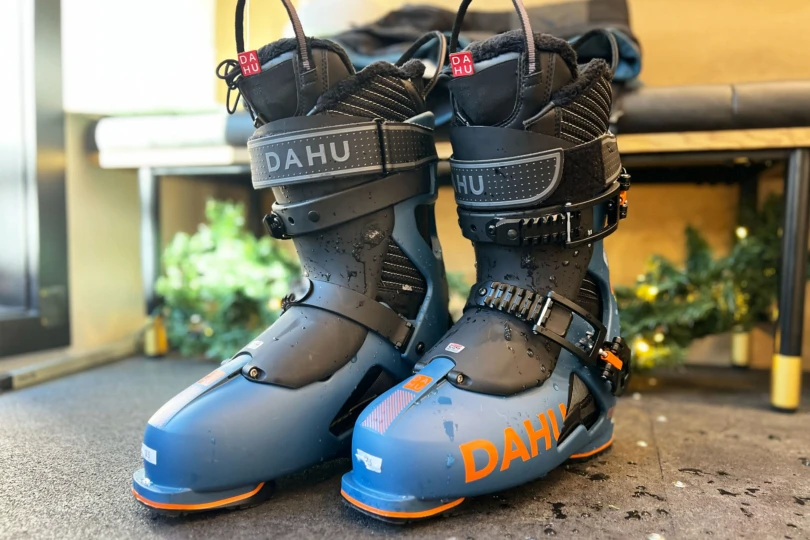In the last year, several brands came out with new goggle systems they felt could rock the interchangeable-lens world. We took four of them for a spin.
Sometimes you feel like a tint, sometimes you don’t. So it is with high-end ski goggles. And while photochromic (“transition”) lenses purport to solve all your optic needs, there’s still a case for a condition-specific lens.
And recently, we’ve seen many brands offer changing lenses for changing conditions — through interchangeable-lens systems. As you might expect, each brand offers its own twist on how to make a lens swap quick, easy, and intuitive. Here, I run through my top picks for the latest interchangeable-lens goggle systems.
These are all cylindrical-style lenses, and each sports its own lens and optic technology. They all have features like venting, anti-fogging, contrast clarity, and cold-tolerance treatments.
While these aren’t the most expensive goggles on the market, innovation, research, and development take time. And as they say, time is money.
Ski Goggles: Interchangeable-Lens Systems
One-Hand Wonder: Bolle Nevada Neo

The results of this test support the claim that you get what you pay for. The new EyeLatch system from Bolle is the most expensive of the technologies in this test. It’s also my overall favorite — especially because I’m not concerned about a frameless style to complete my slopeside look.
The EyeLatch system uses seven neodymium magnet points to guide and hold the lens in place. It also has a single locking point at the center top of the goggle frame. This single locking point allows the wearer to unlock, remove, and replace the Nevada Neo lens ($280) with just one hand — even while wearing the goggle.
Of the four pairs of goggles in this review, the EyeLatch system proved the easiest and most intuitive to use and could be completed in practically one motion. It required the least amount of fidgeting and alignment.

The center locking piece needs to be flipped up before you can remove the lens. So this system also clearly indicates when the lens is ready to be removed or is locked in place. The magnets hold the lens nicely to ensure the lens won’t pop out accidentally once the lock is lifted. Then, to place the lens back into the frame, the magnets suck the lens right into place. When the center locking tab is flipped down, the goggle is ready to go.
Skiers can complete this process with a medium-thick glove. But when gloves get too bulky, the chances of fumbling the lens increase. Familiarity with the system is key to properly grip the lens to remove it from the frame. I would like to see a little bit of a thicker tab on the rim of the lens right where, or near where, the lock flips down to make it easier to grab and ensure a good grip.

The single locking tab is solid, and I’m confident the lens won’t pop out of the frame, even in the most spectacular wipeout. I will admit though, I didn’t purposely crash to test any of these goggles.
Check Price at AmazonCheck Price at Bolle
Budget Option: Spy Marauder

Spy’s Deadbolt lens-locking system on the Marauder ($180) has two latches — one on each side of the frame. These work with two small magnets, one at the top center and one at the nose bridge, to hold the lens.
The design is fantastic — you can remove the lens with one hand while wearing the goggle. But that one-hand system requires first unlocking one side of the lens by sliding the latch up and then unlocking the other side the same way. Then the user can pull the lens right off of the frame.
It’s easier to pull the lens from the side than to try and grab it from the center above the nose — that’s right where the two guiding magnets are. But the frameless design gives the user very little to hold onto without touching the lens.

The relatively large locking latches on the sides of the lens slide up to unlock and down to lock the lens in place. The latches are large as well as easy to find and unlock with medium-weight gloves on.
Because the Marauder has only two magnets in the center, there’s some potential for user error that prevents the lens from seating correctly on the sides. If you can’t press the Marauder lens into the frame while also pressing down the side sliding locks, there’s a chance the motion of moving the locking sliders down could push the lock tab back out of the frame.
Then, the lenses won’t securely attach.

Some magnets on the side by those tabs could eliminate this problem, but then the price wouldn’t be as low as $180.
Check Price at REICheck Price at Spy Optic
No Magnets: Dragon RVX OTG

The Dragon RVX OTG ($230) Swiftlock 2.0 system has only one locking lever to remove the lens from the frame. The lever sits under the right eye and releases with the thumb.
The Swiftlock 2.0 system allows users to remove the lens easily with one hand, even while wearing a glove. But you’ll need to practice putting the lens back in place with just one hand. The lever released by the thumb is spring-loaded, so it must be held open to stay in the unlocked position.
Then, use your other hand to pull the lens from the frame. The frameless style only provides a thin bit of material for the fingers to hold while the lens is coming out.

Instead of magnets, the RVX OTG lens has two pivot tabs on the left side of the lens as a point of guidance to get the lens back into the frame. This goggle had the most difficult lens to place back into the frame while wearing. But with some focused practice, it’s doable.
But if one of the hinging tabs on the left is not in place before the right side of the lens is locked in, you’ll need to unlock, remove, and seat the lens again. Once you get the lens in, though, it stays in place. This might be the best option for those who wear glasses under their goggles per the OTG (over the glasses) moniker.
Check Price at BackcountryCheck Price at evo
Women’s-Specific: Anon WM3 MFI Perceive Goggles
Anon’s WM3 MFI Goggles ($230) are specifically designed to fit smaller faces and were redesigned from Anon’s first women’s goggle model (the WM1) to be thinner and lighter. The cylindrical goggles have a trifecta of Anon’s latest technology: in the design, frame, and lenses.
The WM3 Goggles have Anon’s MAGNA-TECH lens system, which uses nine high-strength, rare-earth magnets to let you swap out lenses on the fly. The magnets in the frame and on the lenses align themselves, and the goggle is one-hand-adjustable.
To remove the lens, simply pinch the frame with your thumb and forefinger. The magnets are strong and require some tendon strength. The easiest way to remove is to pinch on either side, grabbing the lenses by their edges.
If wearing mittens, our female tester found it easier to change out the lenses with the goggles off her face.
Like the other goggles on this list, the WM3 comes with two sets of lenses. Our female tester has been using the violet-and-red-tinted Perceive lens (14% VLT) for most days. She uses the spare amber lens (59% VLT) for low-light conditions.
Overall, the interchange system on the WM3 goggles works great, and the goggles are a welcome update from Anon’s OG WM1.
Check Price at Burton











